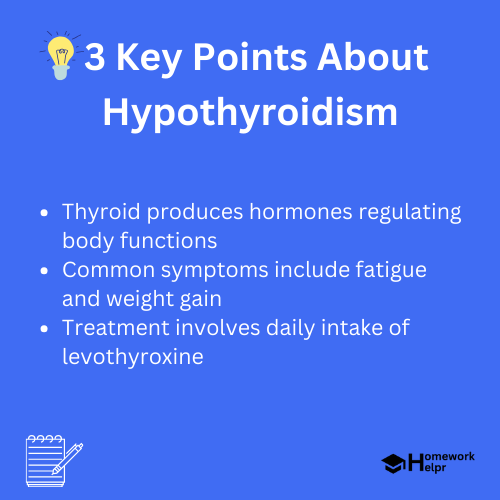📝 Summary
Hypothyroidism is a condition where the thyroid gland fails to produce sufficient hormones, affecting metabolism, temperature, and heart function. Common causes include autoimmune diseases like Hashimoto’s thyroiditis, radiation therapy, certain medications, and iodine deficiency. Symptoms vary but often include fatigue, weight gain, cold intolerance, and dry skin. Diagnosis involves blood tests measuring TSH and Free T4 levels. Treatment primarily consists of the medication levothyroxine to replace missing hormones, complemented by lifestyle changes. If untreated, hypothyroidism can lead to serious complications, such as heart disease and severe depression. Regular monitoring and lifestyle adjustments are crucial for effective management.
Understanding Hypothyroidism
Hypothyroidism is a medical condition that occurs when the thyroid gland does not produce enough hormones to regulate various bodily functions. The thyroid, a small butterfly-shaped gland located in the neck, plays a crucial role in maintaining the body‚’ metabolism, temperature, and heart function. When the thyroid is underactive, it can lead to a range of symptoms that affect both physical and mental health.
Definition
Hypothyroidism: A disorder characterized by insufficient production of thyroid hormones.
Causes of Hypothyroidism
There are several potential causes of hypothyroidism. Understanding these can help in identifying and managing the condition effectively. Some of the most common causes include:
- Autoimmune Disease: The most prevalent cause is Hashimoto’s thyroiditis, where the immune system attacks the thyroid gland.
- Radiation Therapy: Treatment for cancers of the head and neck can damage the thyroid.
- Medications: Certain drugs, like lithium and amiodarone, can affect thyroid function.
- Iodine Deficiency: Iodine is crucial for hormone production, and lack of it can lead to hypothyroidism.
Identifying the underlying cause of hypothyroidism is essential for appropriate treatment. Each cause may require different management strategies.
Symptoms of Hypothyroidism
The symptoms of hypothyroidism can vary significantly from person to person. Some common symptoms include:
- Fatigue: People often experience extreme tiredness and lethargy.
- Weight Gain: An unexplained increase in weight can be a significant indicator.
- Cold Intolerance: Increased sensitivity to cold temperatures is common.
- Dry Skin and Hair: Skin may become dry, and hair may become brittle.
In more severe cases, individuals may also experience depression, memory problems, and difficulty concentrating. Recognizing these symptoms early can lead to prompt diagnosis and treatment.
Definition
Fatigue: Extreme tiredness resulting from mental or physical exertion or illness.
💡Did You Know?
Did you know that more than 10% of women over the age of 50 have some form of hypothyroidism?
Diagnosis of Hypothyroidism
Diagnosing hypothyroidism typically involves a combination of physical examinations and blood tests. The blood tests measure the levels of:
- Thyroid Stimulating Hormone (TSH): An elevated TSH level often indicates an underactive thyroid.
- Free T4: Low levels of this hormone confirm a diagnosis of hypothyroidism.
Doctors may also check for antibodies associated with autoimmune diseases like Hashimoto’s thyroiditis. A comprehensive evaluation helps in creating an effective treatment plan.
Treatment for Hypothyroidism
The primary treatment for hypothyroidism is replacing the missing thyroid hormone. This is usually done using a medication called levothyroxine, which is a synthetic form of the T4 hormone. Here are key points about treatment:
- Daily Medication: Most patients will need to take this medication once a day, ideally on an empty stomach.
- Regular Monitoring: Follow-up blood tests are essential to ensure hormone levels are within the normal range.
- Potential Side Effects: Some individuals might experience side effects, which should be discussed with a healthcare provider.
In addition to medication, lifestyle changes such as a balanced diet and regular exercise can be beneficial. Monitoring iodine intake is also crucial, especially in people whose hypothyroidism is caused by iodine deficiency.
Example
For instance, if someone is taking levothyroxine, they should aim to keep their medication schedule consistent-taking it at the same time each day can lead to better management of their condition.
Living with Hypothyroidism
Living with hypothyroidism requires ongoing management and lifestyle adjustments. Here are some tips to help cope with the condition:
- Stay Informed: Learning about the condition empowers patients to make informed decisions.
- Consult Healthcare Providers: Regular check-ups and discussions with a doctor can help manage symptoms effectively.
- Join Support Groups: Connecting with others facing the same challenges can provide emotional support and practical advice.
Maintaining a healthy lifestyle through proper diet and exercise can maximise the benefits of treatment, allowing individuals to lead fulfilling lives despite their condition.
Definition
Levothyroxine: A medication used to replace thyroid hormones in patients with hypothyroidism.
Complications of Untreated Hypothyroidism
If left untreated, hypothyroidism can lead to serious health risks, including:
- Heart Disease: Low hormone levels can lead to high cholesterol, increasing heart disease risk.
- Infertility: Hormonal imbalances can interfere with ovulation in women.
- Severe Depression: Untreated hypothyroidism can worsen mental health conditions.
In rare cases, severe hypothyroidism can lead to a life-threatening condition called myxedema coma, characterized by extreme cold intolerance, drowsiness, and even unconsciousness. This is a medical emergency and requires immediate attention.
Conclusion
Hypothyroidism is a significant health issue that affects thousands of people worldwide. Understanding its causes, symptoms, and treatment options can help in managing this condition effectively. While it requires ongoing management, many people lead healthy, active lives with the right treatment and lifestyle adjustments. Staying informed about hypothyroidism and regular visits to healthcare providers can greatly improve life quality for those affected.

Related Questions on Hypothyroidism
What is hypothyroidism?
Answer: Hypothyroidism is a medical condition characterized by insufficient production of thyroid hormones by the thyroid gland.
What causes hypothyroidism?
Answer: Common causes include autoimmune diseases, radiation therapy, certain medications, and iodine deficiency.
What are the symptoms of hypothyroidism?
Answer: Symptoms include fatigue, weight gain, cold intolerance, dry skin, and in severe cases, depression.
How is hypothyroidism treated?
Answer: It is primarily treated with levothyroxine medication to replace missing hormones, along with regular monitoring and lifestyle adjustments.
